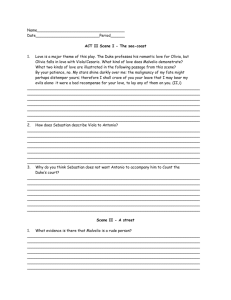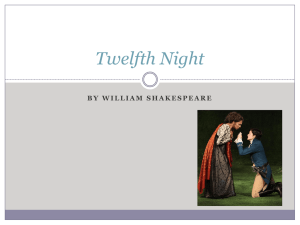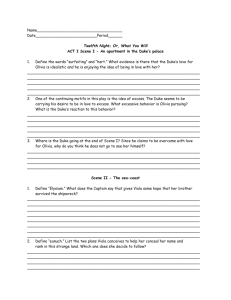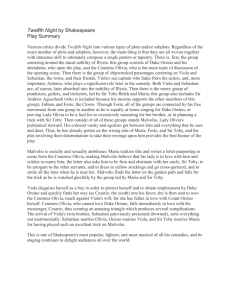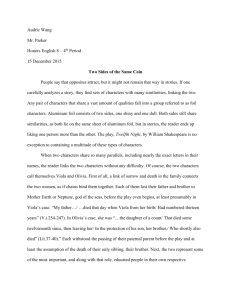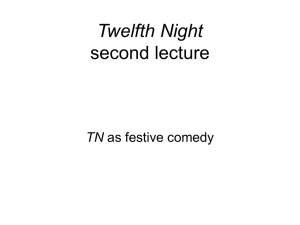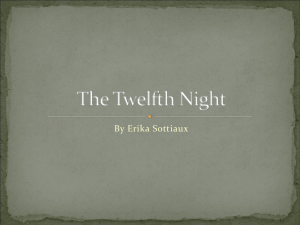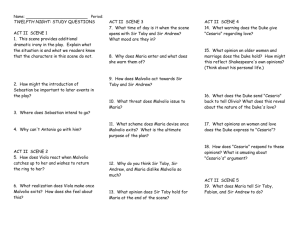STUDY GUIDE Twelfth Night short version
advertisement
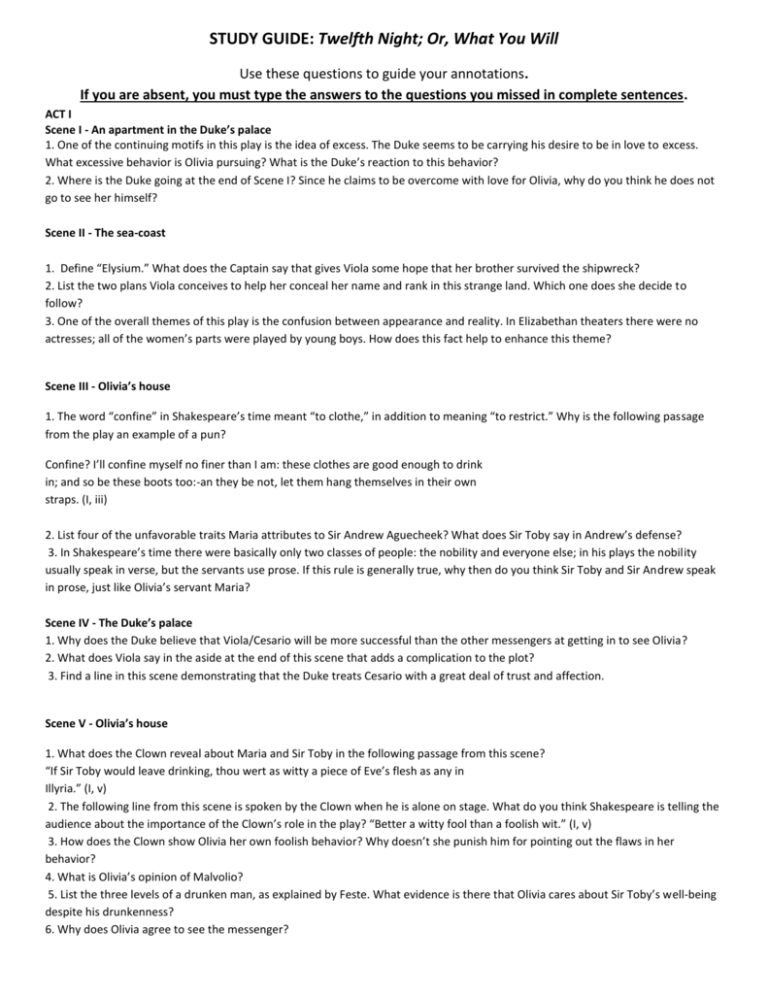
STUDY GUIDE: Twelfth Night; Or, What You Will Use these questions to guide your annotations. If you are absent, you must type the answers to the questions you missed in complete sentences. ACT I Scene I - An apartment in the Duke’s palace 1. One of the continuing motifs in this play is the idea of excess. The Duke seems to be carrying his desire to be in love to excess. What excessive behavior is Olivia pursuing? What is the Duke’s reaction to this behavior? 2. Where is the Duke going at the end of Scene I? Since he claims to be overcome with love for Olivia, why do you think he does not go to see her himself? Scene II - The sea-coast 1. Define “Elysium.” What does the Captain say that gives Viola some hope that her brother survived the shipwreck? 2. List the two plans Viola conceives to help her conceal her name and rank in this strange land. Which one does she decide to follow? 3. One of the overall themes of this play is the confusion between appearance and reality. In Elizabethan theaters there were no actresses; all of the women’s parts were played by young boys. How does this fact help to enhance this theme? Scene III - Olivia’s house 1. The word “confine” in Shakespeare’s time meant “to clothe,” in addition to meaning “to restrict.” Why is the following passage from the play an example of a pun? Confine? I’ll confine myself no finer than I am: these clothes are good enough to drink in; and so be these boots too:-an they be not, let them hang themselves in their own straps. (I, iii) 2. List four of the unfavorable traits Maria attributes to Sir Andrew Aguecheek? What does Sir Toby say in Andrew’s defense? 3. In Shakespeare’s time there were basically only two classes of people: the nobility and everyone else; in his plays the nobility usually speak in verse, but the servants use prose. If this rule is generally true, why then do you think Sir Toby and Sir Andrew speak in prose, just like Olivia’s servant Maria? Scene IV - The Duke’s palace 1. Why does the Duke believe that Viola/Cesario will be more successful than the other messengers at getting in to see Olivia? 2. What does Viola say in the aside at the end of this scene that adds a complication to the plot? 3. Find a line in this scene demonstrating that the Duke treats Cesario with a great deal of trust and affection. Scene V - Olivia’s house 1. What does the Clown reveal about Maria and Sir Toby in the following passage from this scene? “If Sir Toby would leave drinking, thou wert as witty a piece of Eve’s flesh as any in Illyria.” (I, v) 2. The following line from this scene is spoken by the Clown when he is alone on stage. What do you think Shakespeare is telling the audience about the importance of the Clown’s role in the play? “Better a witty fool than a foolish wit.” (I, v) 3. How does the Clown show Olivia her own foolish behavior? Why doesn’t she punish him for pointing out the flaws in her behavior? 4. What is Olivia’s opinion of Malvolio? 5. List the three levels of a drunken man, as explained by Feste. What evidence is there that Olivia cares about Sir Toby’s well-being despite his drunkenness? 6. Why does Olivia agree to see the messenger? 7. In what way can the following line from this scene be interpreted as both a compliment and an insult? What other insult does Viola/Cesario give to Olivia in this scene? Excellently done, if God did all. (I,v) 8. At the end of this scene why do you think Olivia is willing to turn her life over to fate? I do I know not what, and fear to find Mine eye too great a flatterer for my mind. Fate, show thy force: ourselves we do not owe; What is decreed must be, and be this so. (I, v) 9. Why do you think Olivia speaks in both prose and verse in this scene? ACT II Scene I - The sea-coast 1. Love is a major theme of this play. The Duke professes his romantic love for Olivia, but Olivia falls in love with Viola/Cesario. What kind of love does Malvolio demonstrate? What two kinds of love are illustrated in the following passage from this scene? By your patience, no. My stars shine darkly over me: the malignancy of my fate might perhaps distemper yours; therefore I shall crave of you your leave that I may bear my evils alone: it were a bad recompense for your love, to lay any of them on you. (II,i) 2. Why do you think Sebastian does not want Antonio to accompany him to Count the Duke’s court? Scene II - A street 1. What evidence is there that Malvolio is a rude person? 2. One of the major themes in this play is the confusion between appearance and reality; what is Viola/Cesario suggesting about the consequences of using a disguise? Who is “thou” in the passage below? Disguise, I see, thou art a wickedness, Wherein the pregnant enemy does much. 3. Briefly describe the romantic tangles Shakespeare has presented so far in the play. Scene III - Olivia’s house 1. Define “catch” in this context. What are Sir Toby, Sir Andrew, and the Clown doing when Maria enters the room? What is Maria trying to do? 2. Malvolio comes into the room to deliver a message from Olivia. Why do you think Sir Toby and the Clown poke fun at Malvolio? 3. Why does Maria want to play a trick on Malvolio to make him look foolish? What “vice” in Malvolio is she referring to in the following passage from this scene? The devil a puritan that he is, or any thing constantly, but a time-pleaser; an affectioned ass, that cons state without book and utters it by great swarths: the best persuaded of himself, so crammed, as he thinks, with excellences, that it is his ground of faith, that all that look on him, love him; and on that vice in him will my revenge find notable cause to work. (I, iii) 4. What new information does Sir Toby reveal about his relationship with Maria and about his continued interest in keeping Sir Andrew around? Scene IV - The Duke’s palace 1. What advice is the Duke giving Viola/Cesario in the following passage from this scene? Then let thy love be younger than thyself, Or thy affection cannot hold the bent; For women are as roses, whose fair flower, Being once display’d, doth fall that very hour. 2. Why is the following passage ironic? A blank, my lord. She never told her love, But let concealment, like a worm i’ the bud, Feed on her damask cheek: she pined in thought 3. In this play, Shakespeare presents examples of several types of love: love for a friend, love for a family member, romantic love, mature, unselfish love, and self love. Contrast the Duke’s behavior toward the woman he claims to love with Viola’s behavior toward the man she loves. Which type of love are each of these characters illustrating? Scene V - Olivia’s garden 1. What would Malvolio’s first speech in this scene be called, and why? 2. What does Malvolio fantasize about his new life after he marries Olivia and moves up in social position? 3. Why does Malvolio believe the letter is from Olivia? What convinces him that the letter is written about himself? 4. List the four things the letter asks Malvolio to do if he wants to be Olivia’s husband. 5. What evidence is there that Sir Toby is fond of Maria even though she is a servant? ACT III Scene I - Olivia’s garden 1. Define “tabor.” One of the major themes in this play is the confusion between appearance and reality. In what way does the Clown demonstrate to Viola/Cesario that this theme also applies to words? 2. Shakespeare uses many simile’s and metaphors in his writing. Find an example of a simile and a metaphor in this scene. 3. Viola/Cesario learns from the Clown to chose her words very carefully. Find an example of how she is able to tell Olivia the truth about herself, without telling Olivia that she [Viola] is really female. Scene II - Olivia’s house 1. In this play, there are two distinct plot lines. One is the romantic plot line revolving around the Duke, Olivia, and Viola. Which characters do you think are part of the comic plot line? 2. How is Maria’s practical joke on Malvolio progressing at this point in the story? 3. Find examples of hyperbole and litotes in the end of this act. Scene III - A street 1. Why doesn’t Antonio accompany Sebastian when Sebastian decides to look around the town? Scene IV - Olivia’s garden 1. Which type of “greatness” does Malvolio imagine for himself, as expressed in the dialogue he has with Olivia? Why do you think he does not realize that Olivia is baffled by his behavior? 2. What evidence is there in this scene that Olivia is a compassionate woman? 3. Find a passage in this scene where Malvolio is acting superior to Sir Toby, Maria, and Fabian. 4. Find an example of Shakespeare’s use of irony and explain the irony. 5. Why does Sir Toby not want to give Cesario Sir Andrew’s letter? 6. The Duke has been shown to be a man who enjoys pining away over his unrequited love to great excess. What does the following passage from the play say about Olivia’s tendency toward excessive behavior? “A fiend like thee might bear my soul to hell.” 7. How does Sir Toby manage to get Sir Andrew to agree to the duel? 8. Why does Antonio want to fight Sir Andrew? Why do you think Sir Toby draws his sword on Antonio? 9. What happens to give Viola the idea that her brother Sebastian is still alive? ACT IV Scene I - The street in front of Olivia’s house 1. What do you think is happening in his mind when Sir Andrew says, “Now, sir, have I met you again? there’s for you”? 2. Why would the Clown’s line, “Nothing that is so is so,” be a good title for this scene? 3. What is Olivia asking Sebastian in the following passage? Nay, come, I prithee; would thou’dst be ruled by me! Scene II - Olivia’s house 1. Why does Maria want the Clown to disguise himself as Sir Topas, the curate? 2. What philosophical statement does the Clown, pretending to be Sir Topas, make about darkness? 3. Why does Sir Toby want to end the practical joke on Malvolio? 4. This scene can be very difficult to follow when it is read. Think back to the movie. How did the Clown let the audience know when he is speaking to Malvolio as himself and when he is speaking as Sir Toby? Scene III - Olivia’s garden 1. What possible explanations does Sebastian offer to try and explain Olivia’s proposal of marriage? 2. It is important the audience believes that it is possible for Olivia to be unable to tell the difference between Sebastian and Viola. For what reasons do you think the audience is willing to accept this scenario? ACT V Scene I - Before Olivia’s house. 1. Why does the Clown believe he is “the better for my foes and the worse for my friends”? 2. What does Viola mean when she says, “Here comes the man, sir, that did rescue me”? Why does the Duke think Antonio must be a madman? 3. At what point in this scene do you think the Duke realizes that Olivia is interested in Cesario? 4. Once the Duke realizes he has lost Olivia’s love to Viola/Cesario, he threatens to kill Olivia. What does he decide to do instead? Why do you think Viola willingly goes with the Duke? 5. What do Sir Toby’s remarks to Aguecheek show? 6. How does Viola come to realize that Sebastian really is her brother? 7. Define “durance.” In what way does Shakespeare cleverly work Malvolio back into the plot? 8. What does Fabian suggest, as a possible remedy for Malvolio’s mistreatment? How does Malvolio react to the speech? How with a sportful malice it was follow’d May rather pluck on laughter than revenge; If that the injuries be justly weigh’d That have on both sides pass’d. 9. Why do you think Shakespeare ends the play with a song sung by the Clown? In what way does it support the overall theme that it is important to laugh at the confusion and foolishness in life?
